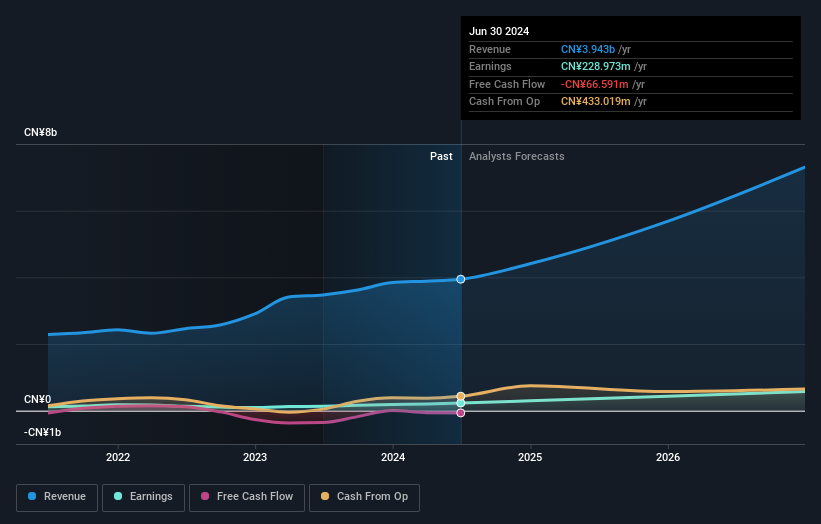Institutions along with individual investors who hold considerable shares inJiangSu Zhenjiang New Energy Equipment Co., Ltd. (SHSE:603507) come under pressure; lose 8.4% of holdings value
Key Insights
- JiangSu Zhenjiang New Energy Equipment's significant individual investors ownership suggests that the key decisions are influenced by shareholders from the larger public
- A total of 9 investors have a majority stake in the company with 51% ownership
- Insider ownership in JiangSu Zhenjiang New Energy Equipment is 29%
A look at the shareholders of JiangSu Zhenjiang New Energy Equipment Co., Ltd. (SHSE:603507) can tell us which group is most powerful. And the group that holds the biggest piece of the pie are individual investors with 34% ownership. In other words, the group stands to gain the most (or lose the most) from their investment into the company.
While the holdings of individual investors took a hit after last week’s 8.4% price drop, institutions with their 32% holdings also suffered.
Let's take a closer look to see what the different types of shareholders can tell us about JiangSu Zhenjiang New Energy Equipment.
Check out our latest analysis for JiangSu Zhenjiang New Energy Equipment

What Does The Institutional Ownership Tell Us About JiangSu Zhenjiang New Energy Equipment?
Many institutions measure their performance against an index that approximates the local market. So they usually pay more attention to companies that are included in major indices.
As you can see, institutional investors have a fair amount of stake in JiangSu Zhenjiang New Energy Equipment. This suggests some credibility amongst professional investors. But we can't rely on that fact alone since institutions make bad investments sometimes, just like everyone does. If multiple institutions change their view on a stock at the same time, you could see the share price drop fast. It's therefore worth looking at JiangSu Zhenjiang New Energy Equipment's earnings history below. Of course, the future is what really matters.

Hedge funds don't have many shares in JiangSu Zhenjiang New Energy Equipment. Zhen Hu is currently the largest shareholder, with 29% of shares outstanding. In comparison, the second and third largest shareholders hold about 5.5% and 4.9% of the stock.
We did some more digging and found that 9 of the top shareholders account for roughly 51% of the register, implying that along with larger shareholders, there are a few smaller shareholders, thereby balancing out each others interests somewhat.
While it makes sense to study institutional ownership data for a company, it also makes sense to study analyst sentiments to know which way the wind is blowing. There are plenty of analysts covering the stock, so it might be worth seeing what they are forecasting, too.
Insider Ownership Of JiangSu Zhenjiang New Energy Equipment
The definition of company insiders can be subjective and does vary between jurisdictions. Our data reflects individual insiders, capturing board members at the very least. The company management answer to the board and the latter should represent the interests of shareholders. Notably, sometimes top-level managers are on the board themselves.
I generally consider insider ownership to be a good thing. However, on some occasions it makes it more difficult for other shareholders to hold the board accountable for decisions.
Our information suggests that insiders maintain a significant holding in JiangSu Zhenjiang New Energy Equipment Co., Ltd.. Insiders own CN¥1.3b worth of shares in the CN¥4.4b company. It is great to see insiders so invested in the business. It might be worth checking if those insiders have been buying recently.
General Public Ownership
The general public-- including retail investors -- own 34% stake in the company, and hence can't easily be ignored. While this size of ownership may not be enough to sway a policy decision in their favour, they can still make a collective impact on company policies.
Private Company Ownership
It seems that Private Companies own 4.9%, of the JiangSu Zhenjiang New Energy Equipment stock. It's hard to draw any conclusions from this fact alone, so its worth looking into who owns those private companies. Sometimes insiders or other related parties have an interest in shares in a public company through a separate private company.
Next Steps:
While it is well worth considering the different groups that own a company, there are other factors that are even more important. Be aware that JiangSu Zhenjiang New Energy Equipment is showing 1 warning sign in our investment analysis , you should know about...
If you would prefer discover what analysts are predicting in terms of future growth, do not miss this free report on analyst forecasts.
NB: Figures in this article are calculated using data from the last twelve months, which refer to the 12-month period ending on the last date of the month the financial statement is dated. This may not be consistent with full year annual report figures.
Have feedback on this article? Concerned about the content? Get in touch with us directly. Alternatively, email editorial-team (at) simplywallst.com.
This article by Simply Wall St is general in nature. We provide commentary based on historical data and analyst forecasts only using an unbiased methodology and our articles are not intended to be financial advice. It does not constitute a recommendation to buy or sell any stock, and does not take account of your objectives, or your financial situation. We aim to bring you long-term focused analysis driven by fundamental data. Note that our analysis may not factor in the latest price-sensitive company announcements or qualitative material. Simply Wall St has no position in any stocks mentioned.
 Index Options
Index Options CME Group
CME Group Nasdaq
Nasdaq Cboe
Cboe TradingView
TradingView Wall Street Journal
Wall Street Journal